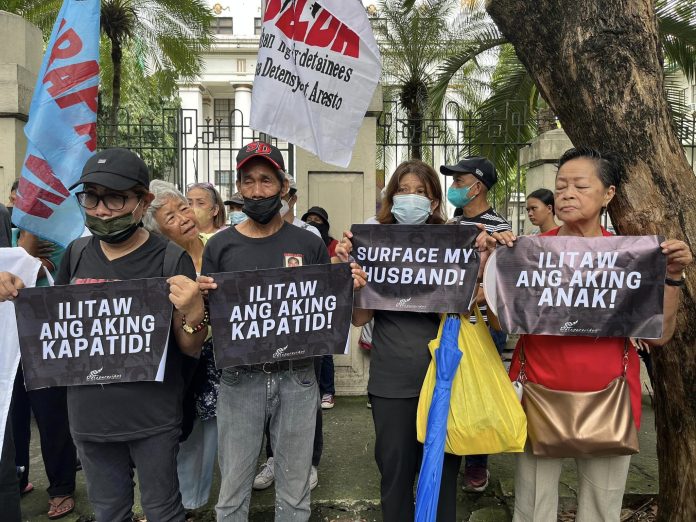“Days have turned into weeks and weeks into months” but the families of the two missing activists in Cordillera are still hopeful that their loved ones will be surfaced.
“We continue to seek justice and hope the day will soon come when we stop counting, and we worry no more,” said Eli Capuyan, brother of Dexter Capuyan who was allegedly abducted by state agents on April 28.
The 56-year-old Dexter – who is an activist based in Benguet – was with Gene Roz Jamil “Bazoo” de Jesus, information and communication officer of the Philippine Task Force for Indigenous People’s Rights, when he went missing in Rizal province.
Idda de Jesus, sister of Bazoo, said four months have passed “without any news on the condition of Bazoo and Manong Dexter, our plea continues that they be surfaced, their whereabouts be known soonest”.
The kin of the two missing activists joined human rights groups and other families of the victims of enforced disappearances in a protest rally to mark the International Day of the Victims of Enforced Disappearances on August 30.
The disappearance of Dexter and Bazoo brings to eight the number of desaparecidos (disappeared) in the first year of President Ferdinand Marcos Jr.
Cristina Palabay, secretary general of Karaptan, said from the regime of Marcos Sr. in the 70s and 80s to the current administration of Marcos Jr., “enforced disappearances have been a tool used to instill fear and silence critics”.
Palabay reported that “more than 1,000 individuals disappeared under the Marcos Sr. military rule, 821 during the Cory Aquino regime, 39 under Fidel Ramos, 26 under Joseph Estrada, 206 under Gloria Macapagal Arroyo, nine under Benigno “Noynoy” Aquino, at least 20 under Rodrigo Duterte, and 8 so far under Marcos Jr.”.
“Enforced disappearances are not just numbers; they represent lives lost, families torn apart, and communities living in fear,” she said.
According to the International League of Peoples’ Struggle, justice proves elusive for the victims of enforced disappearances, “mainly due to the absence of any government or state willing to openly acknowledge a policy of abduction and disappearance”.
The group said despite international agreements to protect people from enforced disappearance in place, many states “have yet to adopt them”.
“Our appeal for these nations to sign the Convention becomes even more urgent as we simultaneously demand justice and accountability from them for the history of enforced disappearances spanning past regimes to the present day,” the group said.
In the country, despite the enactment of the Anti-Enforced or Involuntary Disappearance Act of 2012, “enforced disappearances have not stopped,” according to Palabay.
Isabel Batralo, vice chairperson of Desaparecidos, an association of the families and close friends of victims of enforced or involuntary disappearance, said the “act of enforced disappearances is a heinous crime and is inherently unjust”.
Batralo, whose brother went missing in 2006, said the reason why families of the victims of enforced disappearances “persist in our fight” because “justice remains elusive”.









